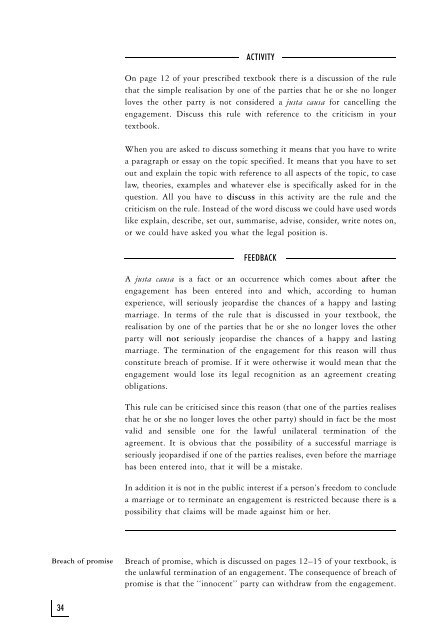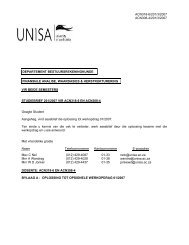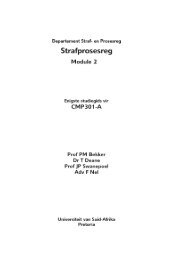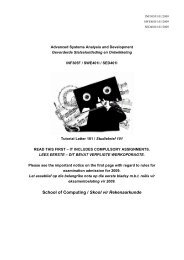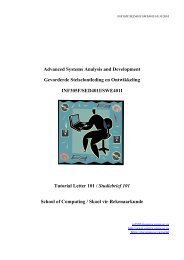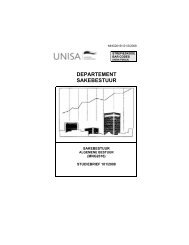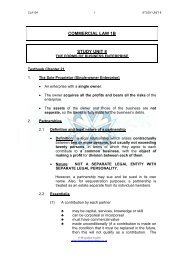key to the study guide - Name
key to the study guide - Name
key to the study guide - Name
Create successful ePaper yourself
Turn your PDF publications into a flip-book with our unique Google optimized e-Paper software.
ACTIVITY<br />
On page 12 of your prescribed textbook <strong>the</strong>re is a discussion of <strong>the</strong> rule<br />
that <strong>the</strong> simple realisation by one of <strong>the</strong> parties that he or she no longer<br />
loves <strong>the</strong> o<strong>the</strong>r party is not considered a justa causa for cancelling <strong>the</strong><br />
engagement. Discuss this rule with reference <strong>to</strong> <strong>the</strong> criticism in your<br />
textbook.<br />
When you are asked <strong>to</strong> discuss something it means that you have <strong>to</strong> write<br />
a paragraph or essay on <strong>the</strong> <strong>to</strong>pic specified. It means that you have <strong>to</strong> set<br />
out and explain <strong>the</strong> <strong>to</strong>pic with reference <strong>to</strong> all aspects of <strong>the</strong> <strong>to</strong>pic, <strong>to</strong> case<br />
law, <strong>the</strong>ories, examples and whatever else is specifically asked for in <strong>the</strong><br />
question. All you have <strong>to</strong> discuss in this activity are <strong>the</strong> rule and <strong>the</strong><br />
criticism on <strong>the</strong> rule. Instead of <strong>the</strong> word discuss we could have used words<br />
like explain, describe, set out, summarise, advise, consider, write notes on,<br />
or we could have asked you what <strong>the</strong> legal position is.<br />
FEEDBACK<br />
A justa causa is a fact or an occurrence which comes about after <strong>the</strong><br />
engagement has been entered in<strong>to</strong> and which, according <strong>to</strong> human<br />
experience, will seriously jeopardise <strong>the</strong> chances of a happy and lasting<br />
marriage. In terms of <strong>the</strong> rule that is discussed in your textbook, <strong>the</strong><br />
realisation by one of <strong>the</strong> parties that he or she no longer loves <strong>the</strong> o<strong>the</strong>r<br />
party will not seriously jeopardise <strong>the</strong> chances of a happy and lasting<br />
marriage. The termination of <strong>the</strong> engagement for this reason will thus<br />
constitute breach of promise. If it were o<strong>the</strong>rwise it would mean that <strong>the</strong><br />
engagement would lose its legal recognition as an agreement creating<br />
obligations.<br />
This rule can be criticised since this reason (that one of <strong>the</strong> parties realises<br />
that he or she no longer loves <strong>the</strong> o<strong>the</strong>r party) should in fact be <strong>the</strong> most<br />
valid and sensible one for <strong>the</strong> lawful unilateral termination of <strong>the</strong><br />
agreement. It is obvious that <strong>the</strong> possibility of a successful marriage is<br />
seriously jeopardised if one of <strong>the</strong> parties realises, even before <strong>the</strong> marriage<br />
has been entered in<strong>to</strong>, that it will be a mistake.<br />
In addition it is not in <strong>the</strong> public interest if a person's freedom <strong>to</strong> conclude<br />
a marriage or <strong>to</strong> terminate an engagement is restricted because <strong>the</strong>re is a<br />
possibility that claims will be made against him or her.<br />
Breach of promise Breach of promise, which is discussed on pages 12±15 of your textbook, is<br />
<strong>the</strong> unlawful termination of an engagement. The consequence of breach of<br />
promise is that <strong>the</strong> ``innocent'' party can withdraw from <strong>the</strong> engagement.<br />
34


